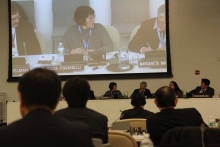Rosa Pavanelli addresses UN session on water and disasters

On Wednesday, 6 March 2013, UN Secretary-General Ban Ki-moon convened a Special Thematic Session on Water and Disasters so that countries and organizations could trade best practices and discuss international targets for damage reduction and preparedness. He made special mention of the sacrifice of a Japanese firefighter involved in rescue efforts following the great tsunami that hit East Japan in 2011, who gave his own life “and never returned home.”
Rosa Pavanelli, the newly-elected General Secretary of Public Services International, called on government leaders to respect and consult frontline workers who are responsible for disaster preparedness, response and recovery. “We need better tools and training to do our jobs, tools that government must provide instead of the private sector,” she said. “The right to a safe and healthy workplace is fundamental.”
“Some countries don’t let their water workers join trade unions,” Pavanelli added. “That’s unacceptable.” Given this routine violation of international labour law, “How can you expect workers to put themselves in harm’s way when their rights are being violated? All the time, public services are being degraded. I am counting on you to join us to reverse this trend,” she said.
Pavanelli recounted how, during the Mediterranean droughts of the past decade, firefighters – on loan from countries including Spain and Italy, encountered radically different working conditions and equipment standards on the sundered shores of Malta and Greece. Out of this experience, PSI’s European branch, EPSU, has developed an initiative to harmonize worker training, health, and safety across the continent.
Panel chair Margareta Wahlström commended Pavanelli’s presentation: “You are the only one on this panel who represents people,” providing “perspective on the people that we are so used to seeing in photos and films around the world, doing the jobs that we admire.”
The session drew prominent delegations from the Netherlands and Japan (which lost 13,000 lives to the Great East Japan Earthquake in 2011). Speakers ranged from a high school student from Minamisanriku, a town devastated by the earthquake, to Japan’s Crown Prince. Last year, PSI honoured the All-Japan Prefectural and Municipal Workers Union (JICHIRO) with the Public Service Trade Union Award for its central role in disaster relief.
UNESCO laid out a three-pronged approach: research, information networking, and training. The Asian Development Bank’s Woochong Um, noting the bank’s focus on whether investments are “bankable or not”, touted its 17 billion dollars in disaster-related funding. Others, like the Global Water Partnership, announced upcoming initiatives. In testament to the International Year of Water Cooperation, all agreed on proactive investment, trans-national data integration, and regional collaboration.
Willem-Alexander, the Prince of Orange, asked the body to consider the Netherlands’ round-the-clock threat of flooding. “Imagine torrents of water entering your home, turning your life upside down in their wake,” he said. “Families shattered and your life’s work washed away in a matter of hours.”
For labour, Pavanelli noted, these experiences require little imagination. Because workers often live in the communities that they represent, “they can put together the interest of the workplace and the community.”
Pavanelli demanded that labour be included in conversations of shared governance – an uphill battle in the midst of labour-squeezing national governments and neoliberal international bodies.
“In my view it’s important that all the parts of the so-called civil society are involved. Trade unions are not only social partners, but must be considered as alive actors of civil society.”
Please see the text for Rosa Pavanelli’s official speech to the United Nations forum below.
A special report for PSI by New Internationalist writer James Cersonsky

